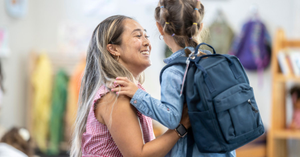Before my daughter was born, I feared I wouldn’t know how to be a good dad. I feared that my tendency to become frustrated quickly, to close myself off from other people, and to feel negative about myself generally, would adversely affect my ability to be a nurturing and responsive dad. On the flip side, I feared I wouldn’t be able to understand and learn from my childhood. I never doubted that I would love my daughter deeply. I knew my parents loved me deeply, but I also knew from experience that love isn’t always enough. Deep down, I felt inadequate, and I didn’t want to pass this feeling onto my daughter. Below are the 7 ways we can potentially repeat the mistakes our parents made. I’ve also included tips and strategies, based on my experience and reading, to help us through the process of ensuring we aren’t reacting to our past but being the parents we want to be.
Parenting norms change from generation to generation.
I recently read, in a national parent survey conducted by the nonprofit Zero to Three, three results that did not surprise me and confirmed my experience growing up. First, most parents, 9 out of 10, report that their upbringing is a significant influence in how they raise their kids, but only 6 out of 10 parents, found that experience useful. Second, as a member of Generation X, I learned that about half of Generation X’s parents report that they are more positive and use less harsh disciplinary strategies with their children than their parents used with them. And third, around a third of the Generation Xers surveyed report they make less of the following mistakes with their children than their parents made with them: spank, yell, say “because I said so,” call their child names, hit with an object, or embarrass on purpose.
How does our childhood affect how we parent?
While it makes sense that we want to learn from and utilize our positive experiences growing up, we also want to ensure that we do not repeat the mistakes our parents made. Experts identify seven ways we react to our present parenting situation through our past, robbing us of an opportunity to be present and intentionally act when our kids need us.
7 Ways How Your Childhood Affects your Parenting
Seven ways we are reacting instead of intentionally acting:
1. Imitating
This happens when we realize we are either repeating negative comments or carrying out the same negative actions we experienced growing up. For example, there are times I catch myself reacting to my daughter by repeating phrases I haven’t heard since I was a kid growing up.
2. Overreacting
This happens when we overcompensate how our parents treated us growing up. For example, because we didn’t have a lot of money growing up, I’m more likely to give in and make the mistake of buying my daughter an extra treat when she pleads with me at the store.
3. Projecting
This happens when we take the emotions, needs, or qualities we associated with ourselves as children and assume our reality is the same reality of our kids. For example, I often find myself asking my daughter if she is making friends at school. I’ve come to realize this stems from my own challenges having close friends as a child.
4. Recreating
This happens when we unconsciously recreate situations so that we feel or experience the same environment we grew up in. For example, we didn’t often openly talk about the problems we experienced as a family growing up. There are times today when I repeat the same mistake, even though I know it would be better to discuss what’s happening as a family.
5. Being defensive
This happens when we continue to protect ourselves as an adult as we did as a kid. For example, because I was the oldest of four, I often didn’t ask for help growing up. Silence was best. But now that I’m an adult, I stop and try to admit that I need help. It is important to me that our daughter feels like she can ask us for help whenever she needs it.
6. Getting triggered
This often happens when we are frustrated or anxious with our child and react to events that remind us of our own experiences growing up. For example, when my daughter is upset, and I respond, “Why are you crying?” instead of validating what she is feeling and comforting her through the process.
7. Believing in our critical inner voice
This happens when we continue to be influenced by the negative self-perceptions we internalized growing up. I have to work on this one all the time. Whenever I start to feel like I can’t do something, if I can catch myself and think through what’s happening, I realize that I’m often more capable of meeting a challenge once I stop listening to that inner voice. From this mistake, I’ve also learned those times when I’m not capable, that’s when I need to reach out and ask for help.
The more we become familiar with how we revert to our childhood and the mistakes our parents made when reacting to our current situation, the more likely we are to catch ourselves and respond in a way that closely reflects who we want to be as parents.
How do we stop history from repeating itself?
The consensus is, to learn from our past instead of blindly acting out from it, we must be honest about our childhood. Being honest requires us to feel the full pain of our childhood experience, no matter how difficult that process may be. As we become more aware of our past and mistakes our parents made, we also begin to realize that our first reactions to our children, our spouse, really life in general, isn’t always representative of how we want to parent or live. The hard truth is, unprocessed trauma or pain is what causes us to recreate with our spouse and children the same environment and circumstances we grew up in. Sharing with a therapist, your spouse, or a good friend any of the trauma or negative experiences you went through is a great place to start.
We are not blaming our parents.
This can be a common misperception of the process of fully feeling any trauma or negative perceptions we took on as children. For me, once I began the process of creating a narrative of my childhood and exploring how my experience growing up affects how I parent, I began to let go and see my parents as people doing the best they could with what they had. At the same time, we have to acknowledge how the actions and words of our parents, neighbors, teachers, and other family members affected us as children to understand and derive the lessons we need from the past.
How do we know when we are reacting instead of acting?
Based on my reading and experience here are the three steps I’ve used to help me learn from my childhood and be the best parent I can be in the present:
Step One: Spend some time thinking and sharing your own narrative of your childhood with a person you trust.
Step Two: Become familiar with the seven ways listed above of how we react to our kids and life in general. Whenever you lose your patience, react negatively, or feel rotten about yourself, see if you can recognize how you might be reacting to any experiences or old feelings you had growing up.
Step Three: When you’re with your child, and you feel yourself reacting instead of acting, calm and center yourself before responding. Now, this can be super difficult to do, and I work on it every day, but the more we do it, the better we get at it. Here are some techniques I’ve learned and used to help me stop, listen, and then speak:
Techniques to calm yourself.
- Take several deep breaths
- Take a walk
- Listen to music
- Meditate
- Drink a glass of water
- Think before you act
How do we help our children make sense of their experience?
Although none of us want to hurt our kids, we will all inevitably lose our patience at times, say things we don’t mean, or react to them with an “I’m busy” instead of a hug. Knowing this, and instead of beating ourselves up, we can put into practice the following 5 strategies to help our kids understand and process their childhood experiences in real-time instead of later in life.
5 strategies to help your child process their childhood:
- Recognize and validate our kids’ emotions and what they are feeling
- Encourage our kids to share what they are feeling
- Lead by example. Kids see and learn from us, so when they see us collect ourselves and remain calm, they are also learning how to self-regulate their emotions
- Admit when we make a mistake. We are not perfect. Share what you are feeling in a situation and apologize for any mistreatment
- And last, share what you are feeling to make sense of your experience.
One step back can mean two steps forward!
If you examine your past and the negative things you’ve experienced, you’ll see that the top-down approach doesn’t work. This is a process based on mutual respect, honest curiosity, and a willingness to learn from our experience. This also isn’t about blaming our parents, but of resolving our own lingering thoughts and feelings about the past and freeing ourselves to be fully present with our children. Our journey as parents is an ongoing learning experience that sometimes requires us to look backward to know how to move forward.








Be the first one to comment on this story.